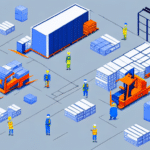Introduction to 3PL E-Commerce Logistics
In today's digital age, e-commerce businesses are rapidly expanding. However, managing the logistics for these businesses can be a daunting task. This is where third-party logistics (3PL) comes into play. By outsourcing logistics to a third-party provider, online retailers can concentrate on their core operations while leaving transportation and logistics management to professionals. Third-party logistics is a supply chain management approach where companies outsource their logistics and transportation operations to specialized service providers. In the context of e-commerce, this allows online retailers to focus on their core business functions while leaving logistics management to experts. 3PL providers handle transportation, warehousing, and distribution of goods, aiming to enhance efficiency and minimize costs.
One of the key benefits of 3PL e-commerce logistics is the ability to scale operations quickly. As online retailers grow, they can seamlessly expand their logistics capabilities by partnering with a 3PL provider, meeting increasing customer demands without significant investments in infrastructure or personnel. Additionally, 3PL providers offer access to advanced technology and expertise, implementing the latest technologies and best practices in logistics management to improve efficiency, accelerate delivery times, and enhance customer satisfaction.
Advantages of Outsourcing to 3PL
Cost Reduction
Outsourcing logistics to a 3PL provider minimizes the need for infrastructure investments in warehousing, transportation, and technology. According to a Logistics Management Report, companies that leverage 3PL services often see a decrease in logistics costs by up to 30%.
Access to Expertise and Advanced Technology
3PL providers ensure utilization of the latest supply chain management technologies and best practices. They leverage sophisticated IT systems like warehouse management systems (WMS) and transportation management systems (TMS) to provide real-time tracking and reporting, enhancing supply chain visibility and operational efficiency.
Cost-Effective Shipping
By leveraging a large network of carriers, 3PL providers can secure competitive shipping rates, reducing overall transportation costs for online retailers.
Customized Solutions and Market Expansion
3PL providers tailor logistics operations to meet specific business requirements, enhancing efficiency and customer satisfaction. They also facilitate entry into new markets by managing international shipping and navigating complex customs regulations.
Selecting the Right 3PL Provider
Key Factors to Consider
- Experience and Expertise: Ensure the provider has a proven track record in e-commerce logistics.
- Technology Systems: Look for advanced WMS and TMS that offer real-time visibility and integration capabilities.
- Flexibility and Scalability: The provider should be able to scale operations as your business grows.
- Carrier Network: A robust network ensures cost-effective and reliable shipping options.
- Customer Service: Excellent customer support is essential for smooth operations.
- Facility Locations: Strategically located warehouses can reduce shipping costs and transit times.
- Sustainability Practices: Providers with eco-friendly operations can enhance your brand’s sustainability credentials.
According to Supply Chain Digital, evaluating these factors helps in selecting a partner that aligns with your business needs and can offer customized solutions as your business evolves.
Evaluating Potential Providers
When selecting a 3PL provider, it's crucial to conduct thorough evaluations. This includes assessing their financial stability, understanding their service level agreements (SLAs), and seeking client testimonials to gauge their reliability and performance.
Optimizing Transportation and Fulfillment
Selecting the Right Transportation Modes
Transportation is a crucial component of e-commerce logistics, directly affecting the customer experience. 3PL providers collaborate with clients to determine the most appropriate transportation modes based on factors such as speed, cost, and distance. The primary modes include:
- Road: Ideal for domestic deliveries with flexibility in routes.
- Air: Suitable for high-value or time-sensitive shipments.
- Sea: Cost-effective for large, bulk shipments, especially internationally.
- Rail: Efficient for heavy and non-urgent shipments overland.
According to the U.S. Department of Transportation, optimizing transportation modes can lead to a 15-20% reduction in logistics costs while improving delivery times.
Streamlining Order Fulfillment
Order fulfillment is a significant challenge for e-commerce businesses. 3PL providers offer customized solutions such as pick and pack, kitting, and assembly to streamline this process. By leveraging the right techniques and technology, 3PL providers ensure that orders are processed, picked, and packed accurately and delivered promptly.
Additionally, 3PL providers offer value-added services like returns management, inventory control, and order tracking. These services enhance customer service and boost brand reputation. With 3PL support, e-commerce businesses can focus on core competencies such as marketing and product development, while logistics operations are handled by experts.
Managing Inventory and Supply Chain
Optimizing Inventory Management
Effective inventory management is crucial for meeting customer demand and reducing costs. 3PL providers assist retailers in optimizing their inventory through advanced software systems that offer real-time visibility. This allows retailers to minimize excess inventory and prevent stockouts, enhancing operational efficiency.
In addition to real-time inventory tracking, 3PL providers offer services such as kitting and bundling. Kitting involves grouping multiple products into a single package, while bundling offers multiple products as a combined item. These services not only streamline inventory management but also provide customers with more options and convenience.
According to a Investopedia report, optimized inventory management can reduce holding costs by up to 25% and improve order accuracy by 20%.
Monitoring and Managing the Supply Chain
Effective management and monitoring of the supply chain are vital for successful logistics operations. 3PL providers offer a range of tools and software that provide retailers with complete visibility into their supply chain activities. By monitoring key performance indicators (KPIs) and other metrics, retailers can optimize their supply chain and boost efficiency.
Implementing best practices such as regular performance reviews, leveraging data analytics, and maintaining clear communication channels with your 3PL provider can further enhance supply chain efficiency and responsiveness.
Overcoming Common Challenges
While partnering with a 3PL provider offers numerous benefits, it also presents certain challenges:
- Visibility: Lack of transparency in the supply chain can lead to delays, lost shipments, and dissatisfied customers.
- Communication: Ineffective communication between the retailer and the 3PL provider can result in mismanagement and errors.
- Poor Inventory Management: Inaccurate inventory tracking can cause stockouts or overstock situations.
- Technology Deployment: Inadequate technology integration can hinder efficient operations.
To overcome these challenges, it is essential to:
- Choose a 3PL provider with robust tracking systems that offer real-time shipment updates.
- Establish clear communication protocols and regular performance reviews.
- Ensure the provider has efficient inventory management systems to maintain accurate stock levels.
- Partner with a 3PL that utilizes advanced technologies to streamline logistics processes.
Addressing these challenges effectively can lead to a more efficient and reliable logistics operation. Collaborating with a knowledgeable 3PL provider that offers customized solutions can mitigate these issues and enhance overall supply chain performance.
Future Trends in 3PL E-Commerce Logistics: Predictions and Projections
The logistics industry is rapidly evolving, driven by advancements in technology. Emerging technologies such as blockchain, artificial intelligence (AI), and the Internet of Things (IoT) are poised to reshape 3PL e-commerce logistics. These technologies enhance transparency, optimize routes, and improve inventory management, enabling 3PL providers to deliver more efficient and reliable services.
Other future trends include the rise of autonomous delivery vehicles and drones, which promise faster and more cost-effective last-mile deliveries. Additionally, sustainability will continue to be a significant focus, with 3PL providers adopting eco-friendly practices to meet growing consumer demand for responsible business operations.
A study by Forbes Technology Council highlights that integrating AI and machine learning can enhance predictive analytics, leading to more accurate demand forecasting and inventory management.
As the e-commerce landscape continues to change, 3PL providers will need to innovate and adapt to stay competitive. Embracing these technologies and trends will allow them to offer superior services, helping online retailers enhance their logistics operations and deliver exceptional customer experiences.
Conclusion
3PL e-commerce logistics providers offer customized, flexible solutions that enable online retailers to concentrate on their core business operations while managing transportation and logistics efficiently. By selecting the right 3PL provider and optimizing the supply chain, e-commerce retailers can enhance efficiency, reduce costs, and provide a superior customer experience.






















